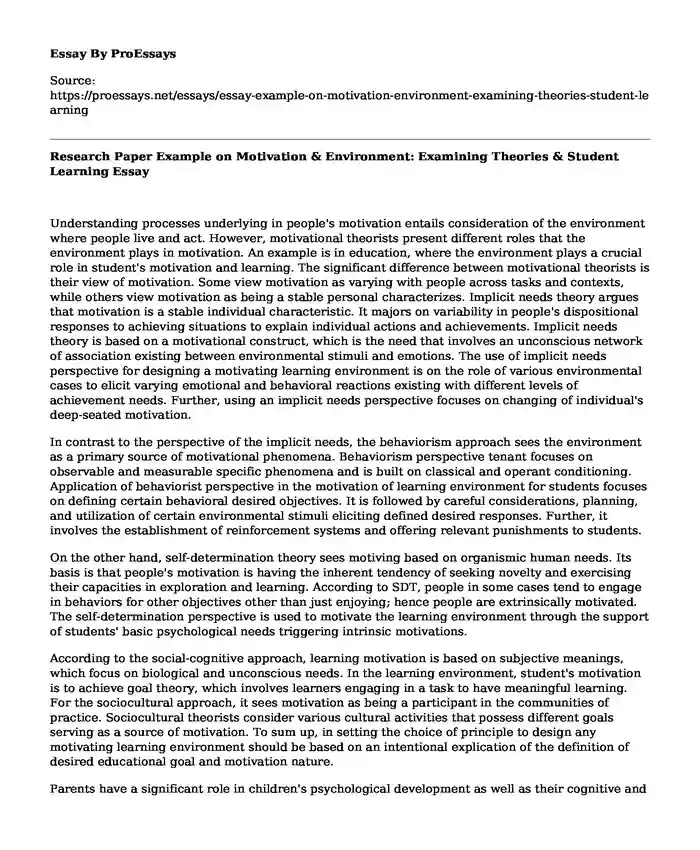Understanding processes underlying in people's motivation entails consideration of the environment where people live and act. However, motivational theorists present different roles that the environment plays in motivation. An example is in education, where the environment plays a crucial role in student's motivation and learning. The significant difference between motivational theorists is their view of motivation. Some view motivation as varying with people across tasks and contexts, while others view motivation as being a stable personal characterizes. Implicit needs theory argues that motivation is a stable individual characteristic. It majors on variability in people's dispositional responses to achieving situations to explain individual actions and achievements. Implicit needs theory is based on a motivational construct, which is the need that involves an unconscious network of association existing between environmental stimuli and emotions. The use of implicit needs perspective for designing a motivating learning environment is on the role of various environmental cases to elicit varying emotional and behavioral reactions existing with different levels of achievement needs. Further, using an implicit needs perspective focuses on changing of individual's deep-seated motivation.
In contrast to the perspective of the implicit needs, the behaviorism approach sees the environment as a primary source of motivational phenomena. Behaviorism perspective tenant focuses on observable and measurable specific phenomena and is built on classical and operant conditioning. Application of behaviorist perspective in the motivation of learning environment for students focuses on defining certain behavioral desired objectives. It is followed by careful considerations, planning, and utilization of certain environmental stimuli eliciting defined desired responses. Further, it involves the establishment of reinforcement systems and offering relevant punishments to students.
On the other hand, self-determination theory sees motiving based on organismic human needs. Its basis is that people's motivation is having the inherent tendency of seeking novelty and exercising their capacities in exploration and learning. According to SDT, people in some cases tend to engage in behaviors for other objectives other than just enjoying; hence people are extrinsically motivated. The self-determination perspective is used to motivate the learning environment through the support of students' basic psychological needs triggering intrinsic motivations.
According to the social-cognitive approach, learning motivation is based on subjective meanings, which focus on biological and unconscious needs. In the learning environment, student's motivation is to achieve goal theory, which involves learners engaging in a task to have meaningful learning. For the sociocultural approach, it sees motivation as being a participant in the communities of practice. Sociocultural theorists consider various cultural activities that possess different goals serving as a source of motivation. To sum up, in setting the choice of principle to design any motivating learning environment should be based on an intentional explication of the definition of desired educational goal and motivation nature.
Parents have a significant role in children's psychological development as well as their cognitive and motivational capacities. Parents play a vital role in a child's motivation and achievement. It is through the parent's commitment of time, resources, and energy. In different phases of development, research show that parental participation had positive influence on the learning achievement. According to self-determination theory, parent involvement is structured rather than chaotic through consistent guidelines and expectations for the children regarding their academic area. The structured technique helps children in understanding the required standards and how to meet them. Further, parenting involvement in a child's development affects their language and literary development. It is clear that exposing children to parental talk greatly impacts the child's oral language development. An example is where children engaged in parental talks tend to have a stronger vocabulary depending on the degree to which parents expose their kids in challenging talks scaffolding their language learning.
Additionally, parental involvement in a child's development affects their math development. Parent's exposure to children's parental numbers helps in children's numerical development. They offer formal and non-formal math-related activities to toddlers. Formal activities involve directly teaching their children concerning numbers, while informal activities include learning numbers through the playing of games like card games and boards. All these activities are involved in the child's competence involving mathematics problems. It depends on the quality of interactions that happen between parents and children during formal and informal activities.
Conclusion
According to research, there should be an integration of the general and the domain-specific perspective in the future. It will help achieve a better understanding of how parents can effectively impact children's motivation and skill development. There is a need to examine different aspects that help improve the benefits of parents' practices on literacy and math. The outcome of the preciouses depends on parents' literacy and mathematics explicitly more so on their understanding of the difference between girls' and boys' motivation. An example is when parents expect more motivation for boys' achievement in mathematics than girls. To solve these perceptions, there is a need to integrate both the general and domain particular perspectives, ensuring that each child, regardless of gender, gets the right motivation in achieving and learning.
Cite this page
Research Paper Example on Motivation & Environment: Examining Theories & Student Learning. (2023, Sep 17). Retrieved from https://proessays.net/essays/essay-example-on-motivation-environment-examining-theories-student-learning
If you are the original author of this essay and no longer wish to have it published on the ProEssays website, please click below to request its removal:
- Ethics and Society of Engineering - Essay Sample
- Essay Example on Creole: Pidgin-to-Standard Language Transformation
- Essay Example on Urban Communities Need Innovative and Adaptable Workforce to Survive
- Freddie's Story: The Impact of Negative Communication - Essay Sample
- Essay on Navigating Parent-Child Relationships: Understanding the Complexities of Rohinton Mistry's Family Matters
- Paper on Older Adults: Mental Health Disorders & Anxiety/Depression
- Privacy Related Matrix - Free Essay Sample







